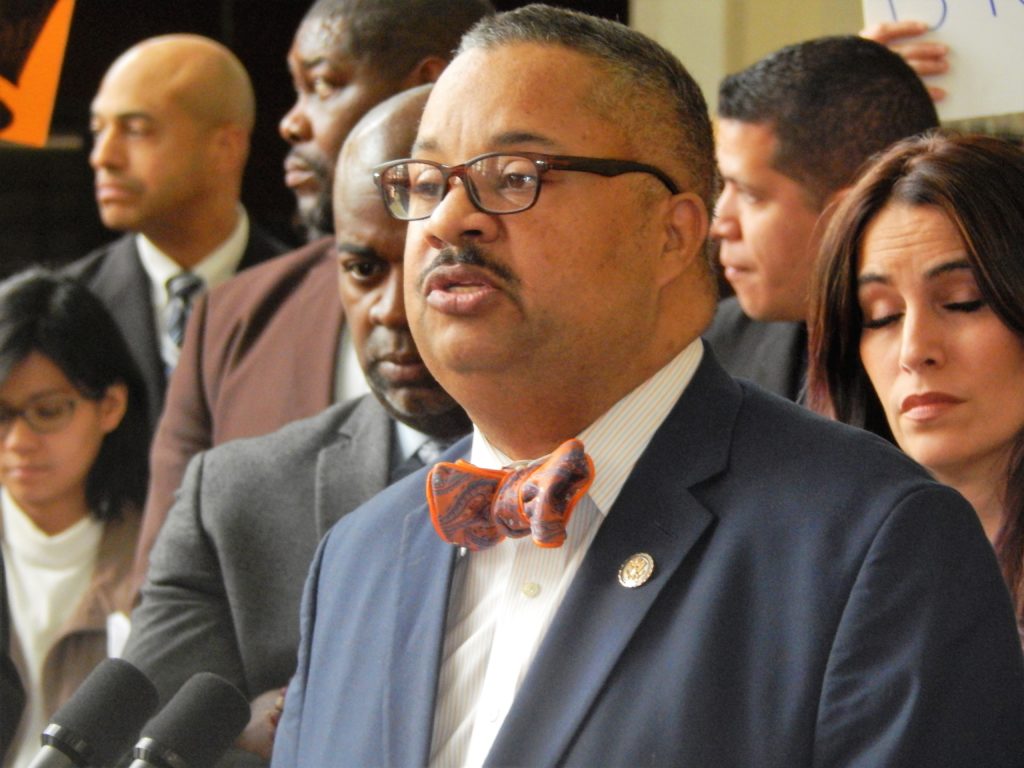Rep. Payne, Jr.’s Colorectal Cancer Prevention Bill Becomes Law

Rep. Payne, Jr.’s Colorectal Cancer Prevention Bill Becomes Law
Washington, D.C. — Congressman Donald M. Payne, Jr.’s bill to decrease colorectal cancer deaths and increase cancer screenings nationwide became law last night.
The bill, the Removing Barriers to Colorectal Cancer Screening Act (H.R. 1570), passed with strong Democratic and Republican support as part of the Omnibus Appropriations and Emergency Coronavirus Relief Act (H.R. 133), an end-of-the-year government funding bill. President Trump signed it into law last night. Now that it is law, Medicare beneficiaries will be covered when doctors remove cancerous growths, or polyps, during routine colorectal cancer screenings, called colonoscopies. Before the bill became law, Medicare covered the screenings only and patients could face surprise charges for the polyp removals after the procedure. The bipartisan bill had three co-leads: Reps. Donald McEachin (D-VA), Rodney Davis (R-IL), and Dave McKinley (R-WV).
“This is a great day for millions of Americans at risk for colorectal cancer,” said Congressman Donald M. Payne, Jr. “I have wanted to pass this bill since I lost my father, Congressman Donald M. Payne, Sr., to the deadly disease in 2012. Now that it is the law, doctors have more freedom to improve the health and safety of millions of Americans. I know it will increase the number of Americans who get screened for colorectal cancer now that they will not get a surprise bill after the procedure and help save thousands of lives annually. I want to thank my colleagues, Reps. Donald McEachin, Rodney Davis, and Dave McKinley, for their leadership in getting this bill bipartisan support and helping to make it a law.”
Colorectal cancer is second only to lung cancer in U.S. cancer deaths every year. Yet, the survival rate from colorectal cancer is one of the highest for all forms of cancer if it is caught early. Currently, it causes more than 50,000 deaths in the United States every year. It is even more deadly for minorities. African Americans are 20 percent more likely to get colorectal cancer and 40 percent more likely to die from it compared to other groups.
“Patients should be able to access life-saving, early detection screenings and treatment for colorectal cancer without the fear of out-of-pocket costs,” said Rep. A. Donald McEachin. “I know firsthand how important it is to catch this disease before it progresses –– a routine colonoscopy saved my life. By closing the existing Medicare loophole, today’s passage of the bipartisan Removing Barriers to Colorectal Cancer Screening Act will expand access to preventative treatment that could save thousands of lives from this insidious disease, and I look forward to it becoming law.”
In addition, colorectal cancer rates have doubled for Americans under 50 years old in the last 30 years. With the passage of this bill, Medicare is held to the same standard of coverage as private health insurance companies, which must cover screenings and surgeries to remove growths.
“Expanding access to colorectal cancer screenings will save lives, and that’s why I’m so excited our bipartisan legislation to expand access to those screenings is included in government funding legislation for the upcoming year,” said Rep. Rodney Davis. “Colorectal cancer is the 2nd leading cause of cancer death among men and women combined in the U.S., and those deaths are preventable. As the husband of a 21-year colon cancer survivor, I know how important those screenings are. I’d like to thank my colleague, Rep. Donald Payne, Jr., for his leadership on this issue in the House and look forward to our legislation being signed into law very soon.”
“Colorectal cancer is one of the deadliest forms of cancer, but with screening and early detection it can easily be treated. Yet, a common barrier stopping thousands of seniors from getting checked is a surprise bill after a routine screening colonoscopy,” said Rep. Dave McKinley. “By passing the Removing Barriers to Colorectal Cancer Screening Act, we can stop surprise billing and remove the obstacle limiting seniors from being screened early. Closing this loophole could prevent upwards of 2,000 colorectal cancer cases over the next 10 years alone.”





